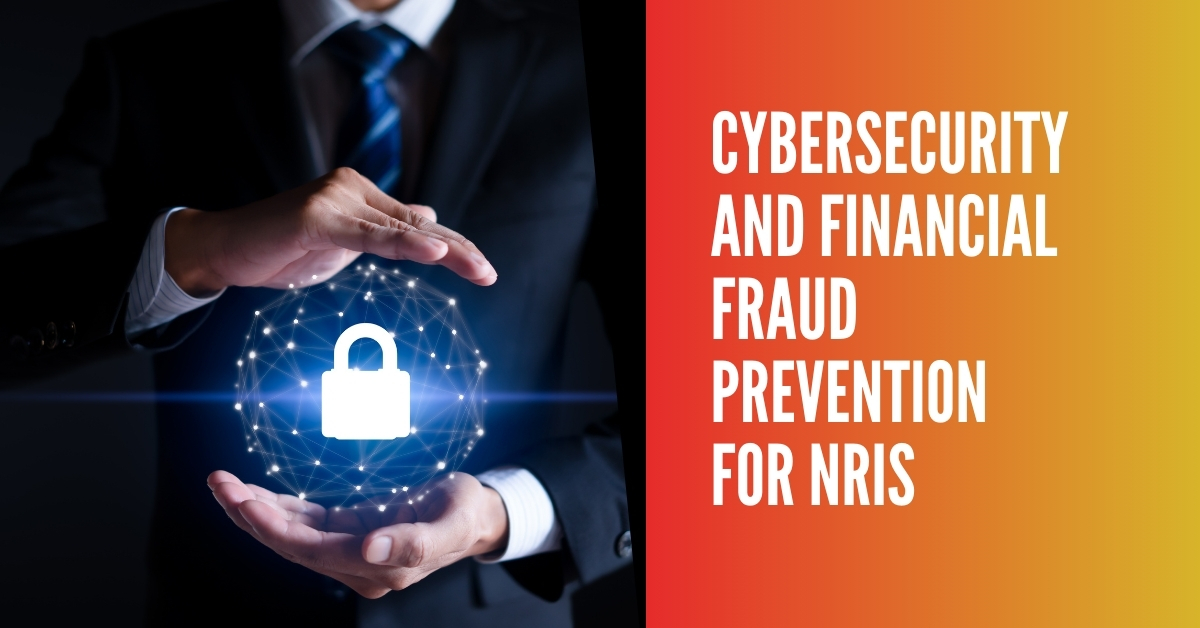Cybersecurity and Financial Fraud Prevention for NRIs
In the digital age, cybersecurity and financial fraud prevention have become paramount concerns, especially for Non-Resident Indians (NRIs) who manage their finances across borders. NRIs often face unique challenges related to financial transactions, investments, and personal data security. With cyber threats evolving rapidly, it is crucial for NRIs to stay vigilant and adopt robust cybersecurity measures to safeguard their assets and personal information. This article explores the importance of cybersecurity and offers valuable tips for NRIs to prevent financial fraud effectively.
Understanding the Cybersecurity Challenges
Cybercriminals are constantly devising sophisticated tactics to exploit vulnerabilities in online systems and target unsuspecting individuals. NRIs are particularly vulnerable to financial fraud due to factors such as distance from their financial institutions, complex international transactions, and varying regulatory frameworks across countries. Common cyber threats faced by NRIs include phishing scams, identity theft, ransomware attacks, and unauthorized access to bank accounts. These threats can lead to significant financial losses and reputational damage if not addressed proactively.
Importance of Cybersecurity for NRIs
Maintaining strong cybersecurity practices is essential for NRIs to protect their financial assets and personal information from cyber threats. A breach in cybersecurity can have devastating consequences, leading to financial losses, reputational damage, and emotional distress. By prioritizing cybersecurity, NRIs can mitigate the risks associated with online transactions and safeguard their financial well-being. Moreover, in today’s interconnected world, the impact of a cyber attack can extend beyond individual finances to affect the broader financial ecosystem and global economy.
Tips for Effective Financial Fraud Prevention
1. Secure Your Devices and Networks
Ensure that all your devices, including smartphones, laptops, and tablets, have up-to-date antivirus software and firewalls installed. Use strong and unique passwords for each online account and enable two-factor authentication for an added layer of security. Regularly update your operating systems and applications to patch any known vulnerabilities. Consider using a virtual private network (VPN) when accessing public Wi-Fi networks to encrypt your data and prevent unauthorized access.
2. Be Cautious of Phishing Attempts
Phishing remains one of the most common methods used by cybercriminals to trick individuals into revealing sensitive information. Be wary of unsolicited emails, messages, or phone calls requesting sensitive information or urging urgent action. Verify the authenticity of the sender before clicking on any links or providing personal details. Do not disclose your financial information or login credentials to unknown or unverified sources. Educate yourself and your family members about the warning signs of phishing scams to prevent falling victim to fraudulent schemes.
3. Monitor Your Financial Accounts Regularly
Regularly review your bank statements, credit card transactions, and investment portfolios for any suspicious activity. Set up account alerts for notifications on account activities and changes to detect any unauthorized transactions promptly. Report any discrepancies or unauthorized charges to your financial institution immediately and follow up to ensure proper resolution. Consider using secure online banking platforms with multi-factor authentication and transaction monitoring features to enhance the security of your financial accounts.
4. Secure Your Online Transactions
When conducting online transactions, use secure and trusted payment gateways that encrypt your financial data to prevent interception by cybercriminals. Avoid sharing sensitive information, such as credit card details or social security numbers, on unsecured websites or public platforms. Verify the legitimacy of the websites you visit and ensure they have secure HTTPS connections before entering any personal information. Be cautious when downloading attachments or clicking on links in emails, as they may contain malware that can compromise your device and steal your data.
5. Educate Yourself on Cybersecurity Best Practices
Stay informed about the latest cybersecurity threats and trends by following reputable sources, such as cybersecurity blogs, industry reports, and government agencies. Attend cybersecurity awareness programs and workshops to learn about new cyber threats and preventive measures. Educate yourself on common cyber scams, such as ransomware, social engineering, and malware, and implement best practices to protect yourself against these threats. Consider enrolling in cybersecurity courses or certifications to enhance your knowledge and skills in cybersecurity.
6. Establish a Response Plan for Cyber Incidents
Despite taking preventive measures, cyber incidents can still occur. It is essential to have a response plan in place to mitigate the impact of a cyber attack and restore your financial security. Create backup copies of your important financial documents and data to recover in case of data loss or ransomware attacks. Contact your financial institutions and credit bureaus immediately if you suspect fraud or unauthorized access to your accounts. Work with cybersecurity experts and legal professionals to investigate the incident and take necessary actions to prevent future attacks.
Investing in Cybersecurity Solutions
Consider investing in advanced cybersecurity solutions to fortify your digital defenses and proactively detect and mitigate cyber threats. Secure your devices with endpoint protection software, encrypt sensitive data stored on your devices and in the cloud, and implement secure password management practices. Explore cybersecurity services offered by reputable providers to conduct regular security assessments, penetration testing, and threat intelligence monitoring to identify and address vulnerabilities in your digital ecosystem.
Engaging in Continuous Learning and Improvement
Cybersecurity is an ever-evolving field, and staying ahead of cyber threats requires a commitment to continuous learning and improvement. Stay informed about emerging cyber risks, regulatory changes, and best practices in cybersecurity through professional certifications, online courses, and industry events. Join cybersecurity forums and communities to exchange knowledge, share insights, and collaborate with experts in the field to enhance your cybersecurity awareness and preparedness.
Securing Your Financial Future as an NRI
As an NRI navigating the complexities of cross-border financial management, securing your financial future is paramount to achieving long-term prosperity and stability. By prioritizing cybersecurity and adopting a proactive stance against financial fraud, you can safeguard your assets, protect your personal information, and mitigate the risks associated with online transactions. Remember, cybersecurity is not a one-time effort but a continuous journey that requires diligence, awareness, and adaptation to stay ahead of cyber threats.
For expert financial guidance and tailored solutions to secure your financial future seamlessly, consult a trusted financial planner for NRI. A knowledgeable and experienced financial advisor can help you navigate the intricacies of international finance, optimize your investment portfolio, and protect your wealth from potential cyber risks. By partnering with a financial planner who understands the unique needs and challenges of NRIs, you can build a robust financial plan that aligns with your goals and values, ensuring a prosperous and secure future for you and your loved ones.
Conclusion –
In conclusion, cybersecurity and financial fraud prevention are integral aspects of financial management for NRIs in today’s digital world. By following the tips and strategies outlined in this article, NRIs can enhance their cybersecurity posture, mitigate financial fraud risks, and safeguard their financial well-being. Stay informed, stay vigilant, and prioritize your cybersecurity to navigate the digital landscape with confidence and resilience. By taking proactive steps to protect your financial interests, you can build a secure and prosperous future as an NRI in a fast-paced and interconnected global economy.





